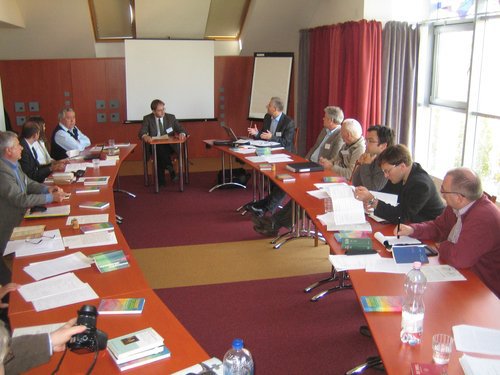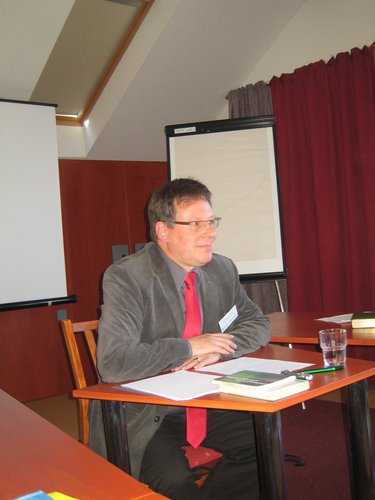In spring 2012 the Synod Assembly of the Reformed Church in Hungary decided that after revising the text, it was to be republished in memory of its first issue. It was necessary, however, to hold a debate regarding Q&A 80, in which the Catholic mass is tagged as "condemnable idolatry". This passage did not appear in the original issue, it was only inserted into the text on its second edition. A few decades ago a footnote was added which clarified that the term needs to be seen in its historical context. The phrase referring to the Catholic church is still considered a controversial one; what's more, under the pressure of communism it had to be temporarily removed.
At the 2012 spring Synod it was proposed that the section be deleted from the new version of the creed, but the Synod's final decision was to keep the text in its original form, although it is easy enough to expect that the debate will continue. As Bishop Gusztáv Bölcskei clarified after the Synod sessions, the churches are capable of rising above the judgmental nature of the 16th century. Although the term remains a "hot potato", rather than erasing the past, it's a much better solution to get beyond it.
All Hungarian Reformed Churches recognize the Holy Scriptures of the Old and New Testaments as the Word of God and the ultimate rule of the Christian faith and practice. In its doctrinal interpretation, it is guided by the Second Helvetic Confession and the Heidelberg Catechism with the liberty of conscience inherent in the Gospel. Both the Second Helvetic Confession and the Heidelberg Catechism are classic statements of reformed faith. By the 1550's, Calvinism was becoming established in Hungary. In 1557 and 1558 a synod was held which resulted in the Hungarian Confession, exhibiting a distinct Calvinistic theology. In 1567, at the Synod of Debrecen, the Hungarian Reformed Church adopted the Heidelberg Catechism and the Second Helvetic Confession.
Regional Conference of Heidelberg Catechism
2013 marks the 450th anniversary of the Heidelberg Catechism, the Reformed Church's internationally accepted confession of faith. On October 7-9, the Reformed churches in Hungary and Austria, along with the Reformed alliance in Germany and participants from the Ukraine, Romania, Croatia, Italy and Poland held a Regional Conference where they reflected on the importance of this confession of faith. They focused on a celebration that extended beyond borders and highlighted the significance of this confession in the life of their church today.
The Catechism, adopted in the 16th century, is the heritage of the Reformed church. It is not just a heritage we receive from our ancestors and pass on to our children, but one that we must constantly redefine and rediscover. It was with this attitude that they organized this conference.

Mattias Freudenberg, a pastor and university professor in Saarland, gave the theological statement at the conference. He stated that the theology of the Heidelberg Catechism is the foundation of theology and confession today. In the16th and 17th century, the aim of the Catechism was to fill in the theological tasks that defined its creation. It offered a biblical basis for man and strengthened the individual's faith. The question now, is if the confession still remains relevant in today's society? He argued that, in short, the answer is yes, because the text points to Jesus who is everything in everything.
Árpád Ferencz, assistant professor of social ethics in Debrecen, also gave a lecture during the conference. He discussed that the Catechism still gives guiding points to the Reformed church today. In the first question of the confession, it is obvious that the people's only chance to free themselves from the self-involvement that imprisons them is to turn yourself to Jesus. The ethics and theology of the confession is Christ centered. The keyword of the Confession's ethics is thankfulness, and this gratitude defines our acts. We are full of thanks because we are saved by Christ.
In his lecture he also spoke about obedience and freedom. He said freedom comes with responsibility. The only good act of man is faith, which is nothing else but a gift of God. The 37th question of the confession is an ethical question. If Jesus Christ frees our bodies and souls from eternal damnation, what kind of consequence does it have on our life and our way of thinking?

Martin Filitz continued the discussion. He said, that the confession is not easy to read, it takes effort, but it is a type of mirror that forces you to confront yourself. It can be a mirror because it is based on scripture. The first aim of the confession is not showing an objective image of God but emphasizing a personal relationship with God. Furthermore, if we are part of Christ's body, we have responsibility to God. This is another important ethical point made in the Catechism. This confession of faith creates a framework of orientation that points out our limitations, but this framework becomes a signpost that guides us in life and our relationship with God.
Participant of the Slovakian Christian Reformed Church, Katalin Pólya, said during the conference, that it was good to see European Reformed churches from different social backgrounds, with different connections and perspectives on the catechism, share a common view on the anniversary. Also, to preserve the confession and discover the value that it contains, do not simply treat it like an artifact in a museum. The importance of confessing our personal faith to God is something that needs to be passed down to our children.
Burns Katalin, Amy Lester